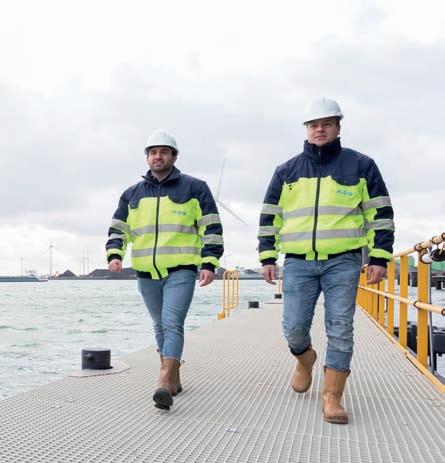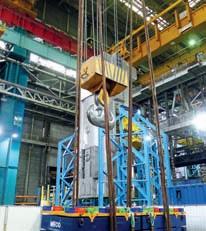
6 minute read
A smooth port visit
The shipping agent’s role
Anyone working on cargo ships knows that there is a lot more to a port visit than simply coming alongside, unloading and/or loading, and departing again.
The procedures already start while the vessel is still at sea, off the coast. The port authority needs to be notified of the ship’s arrival, pilot and tugboat services need to be arranged. The terminal needs to be ready with a berth available and linemen standing by on the quayside. Ship and cargo need to be cleared by customs, while crew and potential passengers need to be reported to immigration. Loading or unloading can then commence, which often occurs simultaneously with bunkering,
stores or other supply deliveries in order to make the visit as short as possible. Then there are things to be arranged for the crew; perhaps there is a crew change or a crew member needs to see a doctor or dentist. All in all, the hours or days spent alongside are filled with ample formalities. Luckily for shipping companies (and vessel crews), that is where shipping agents come in. Shipping agents serve as a local partner for shipping companies, and they arrange and plan all the tasks listed above. With their broad knowledge of port formalities and large local network, shipping agents assist a ship’s crew with virtually everything when in port.
Flushing Shipping Agencies In North Sea Port, one of those agencies is Flushing Shipping Agencies (FSA). Based in the Bijleveldhaven in Vlissingen, FSA was founded in 2006. Between 2006 and 2016, the company merely experienced growth. What started as a two-person enterprise soon required another hand, and then another. FSA presently employs seven people. With fruit as its core sector, FSA’s location in the Bijleveldhaven is ideal. “When you look at the container and reefer vessels that currently frequent Vlissingen, we are exactly where we need to be,” explains Dennis de Groot, General Manager at FSA. “We also have offshore-related customers, such as ships carrying wind turbine parts. That is a completely different business but due to our location, it naturally grew as our neighbours are active in that segment.” When the company just started out, a large percentage of the vessels it performed services for sailed from Vlissingen to Saint Petersburg. When the Russian Federation issued its ban on fruit import from the European Union in 2014, FSA shifted its focus towards tankers and offshore supply vessels, among others.
The shipping agency has meanwhile returned to its original core business of fruit. The increased fruit-related activity of Seatrade in the Bijleveldhaven is one of the factors that enables the company to do so. FSA has always had various loyal customers and has been providing its services to the same vessels for years. Like the Russian fruit import ban demonstrated, it is of vital importance for a shipping agent to draw on different pillars. While the focus for FSA remains on Vlissingen, Mr de Groot does see the benefits of the port merger. “North Sea Port can benefit from a strong international clout. The merged port has convincing figures to present to potential customers,” he says.
The TeAM AT FsA. FroM leFT, Dennis De GrooT, GenerAl MAnAGer, GijsberT Koens, boArDinG clerK/WATer clerK, Wessel MArTens, operATor, Myron De WiT, boArDinG clerK/ WATer clerK, MichAel liplijn, TrAinee, AnD DylAn VenneMAn, operATor.

Taking care of the crew According to Mr de Groot, digitalisation has immensely changed the way shipping agencies work. In the past, a shipping agent would be physically present on the quay, waiting for the ship to come in. Now all he needs to do is check his laptop to know the exact minute the vessel arrives. “We used to frequent the customs post and the Marechaussee. I don’t think the young guys in our team can even imagine visiting those posts all the time. We now handle everything through Enigma+, the port’s digital management system. If any of the input is incorrect, we get an automatic notification. Simple as that.” Once a vessel is moored, a FSA member always stops by, even when all preparations have already been digitally made. One of the reasons for this is, according to Mr de Groot, that while the general focus in port lies on the ship’s cargo and (un)loading procedures, the ship itself and its crew should also be taken care of. If they need ship supplies, such as spare parts, nautical charts, or small personal items for the crew such as sim cards, FSA arranges that, too. “We are currently organising a network of preferred FSA suppliers,” comments Mr de Groot. “Whenever possible, we try and keep our procurement local.”
Connecting link Perhaps in the future, being in the port’s vicinity will no longer be vital for a shipping agency. At present, however, Mr de Groot deems physical proximity a necessary requirement for the job. “Many of our tasks can be done from a distance. But the whole purpose of a shipping agent is to be the contact person in port, to represent the ship and its shipping company, and unburden them,” voices Mr de Groot. “In the maritime industry, something unexpected can always happen. When it does, it is essential to get to the terminal in no time.” While shipping agents have gained access to more real-time information about vessel traffic, digitalisation has also changed the role they play in port. “These days, we serve more as a logistics service provider than as a shipping agent in the traditional sense. We are the connecting link between shipping company, terminal, and port authority,” states Mr de Groot.
Liner service Apart from its regular activities, FSA also has a liner service between Vlissingen and Congo, for which it acts as both booking and shipping agent. Cargo on the liner service can be anything from personal goods for the owner’s family to containerised food product shipments. The liner service sails directly from Vlissingen to Congo. FSA thus offers a short and direct transit and can provide customers with the full package, including pre-shipping transport to the terminal in Vlissingen.

Team strength Mr de Groot started working at FSA as a water clerk when it was founded. He went on to become operational manager. After working at FSA for ten years, he made a side-step to another company in 2017, working as a sales manager for two years. Mr de Groot thoroughly enjoyed the experience, yet always kept an eye on what was happening at FSA. After FSA’s director left the company in 2017, Mr de Groot was approached for the role. He started as General Manager in July 2019. For Mr de Groot, FSA’s strength lies in its enthusiastic, young team. “FSA delivers a team performance. As a shipping agent, you need to be willing to work hard, during nightshifts, weekends, rain or shine, so good personnel truly is key,” he states. For that reason, FSA has strengthened its ties with Scalda, who offer a logistics education programme. Working with young people provides, according to Mr de Groot, a wonderful work environment. “They are eager to learn and open to new ideas. They provide our team with the flexibility that this line of work requires.”
i. www.fsagencies.com

> hoisting equipment > wire ropes > cranes > rigging > fall arrest equipment > hydraulic jacks

> chains and accesoiries > inspection > certification > dynamic loadtesting
Vlissingen-Oost (NL) P.O. box 80 NL - 4450 AB Heinkenszand Groenlandweg 4, Harbor nr. 4056 4455 SN Vlissingen-Oost - NL
Rilland (NL) De Poort 15 NL - 4411 PB Rilland Temse (Belgium) Liftal NV Industriezone TTS Duitslandstraat 4 B - 9140 Temse










